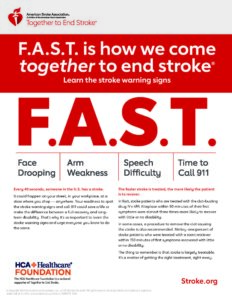Aging • Caregiving • Safety Help for Stroke Victims at Home
In-home stroke care allows seniors to recover safely at home
A stroke is a serious medical emergency. A stroke occurs when a blood vessel that carries oxygen and nutrients to the brain is either blocked by a clot or bursts (or ruptures) and brain cells die. Stroke is the fifth leading cause of death in the United States, according to the American Heart Association.
Do you know the signs of a stroke? When you spot a stroke warning sign, act fast. Recognizing the stroke warning signs and calling 911 immediately may make the difference between a strong recovery or long-term disability; survival or death, according to the American Heart Association.
Warning Signs
The signs of stroke in elderly individuals are the following:
- Numbness in the face/limbs, most commonly on one side of the body
- Sudden vision problems in one or both eyes
- Severe headaches
- Difficulty with communication
- Lack of coordination
An easy way to remember the signs of a stroke is by remembering the word FAST. FAST stands for:
Face Drooping – check for numbness, an uneven smile or signs of drooping
Arm Weakness – look for arm weakness or numbness. When both arms are raised, does one arm drift downward?
Slurred Speech – listen for slurred speech. If a person is difficult to understand, ask them to repeat a simple sentence, like “The sky is blue.”
Any of these signs, it’s Time to Call 911

Time Is Brain
When a person has a stroke, blood flow to the brain is cut off, and the brain is deprived of oxygen. Time is of the essence when treating a stroke. Each moment that a stroke goes untreated, the tissue in the brain is rapidly and irreversibly damaged.
In strokes that are caused by blood clots that block blood flow to the brain, medications called tPAs can be administered to restore blood flow to the brain – if it’s within 3 hours of the first symptoms of the stroke. That’s why it’s important you don’t delay calling 911 if you or someone you know has the stroke warning signs.
Risk Factors
Certain factors put you at greater risk for a stroke. They are:
High Blood Pressure – High blood pressure is the leading cause of stroke and the most significant controllable risk factor. If you know or suspect that you have high blood pressure, make sure you are using medication as prescribed and keeping your numbers low with different lifestyle choices. Talk to your doctor – they may want you to limit sodium, alcohol and caffeine.
Smoking – Both nicotine and carbon monoxide can damage your cardiovascular system which can ultimately lead to a stroke. Quitting smoking can be one life style change that can greatly reduce your chances of a stroke. This is also a good option if you have other stroke risk factors that are not as easily manageable.
Diet & Lifestyle – Talk to your doctor about a heart-healthy diet, such as limiting foods high in saturated fat, trans fat, cholesterol, and sodium. They may also recommend incorporating servings of fruits and vegetables for your overall health and for managing risk.
It is also important to stay active throughout the week. Your doctor can provide suggestions because even walking for 30 minutes a day can do wonders for the body.
Heart/Artery Diseases – Carotid Artery Disease, Peripheral Artery Disease, and AFib are all risk factors for stroke and definitely harder to manage. Keeping up with a healthy diet will limit the chances of plaque build up in your arteries or reduce chance of clots. Worrying about your heart health is extremely important for managing stroke risk as the link between heart disease and stroke is significant.
Home Care After a Stroke
HouseWorks Caregivers help seniors recover and adapt to new physical limitations following a stroke.
- Personal care, from a few hours a week to 24-hour and live-in care
- Help with showering and dressing
- Medication reminders
- Healthy meal planning and prep
- Transportation to and from doctor’s appointments
- Assistance with range of motion exercises recommended by a licensed physical therapist
- Companionship and conversation to help practice speech/language therapies
- Coordination for transitions to home after a hospital or rehabilitation stay
Why choose in-home post-stroke care?
- Familiar surroundings are comforting and welcoming after cognitive changes
- Caregivers can monitor for any physical or behavior changes that may signal a stroke recurrence
- Close monitoring can reduce the risk of falls
- Being around loved ones can provide motivation to complete rehabilitation activities
HouseWorks provides individual attention that helps individuals recovering from a stroke live at home safely and comfortably. For more information about in-home care services at HouseWorks, call 617-928-1010 or visit https://www.house-works.com/.

